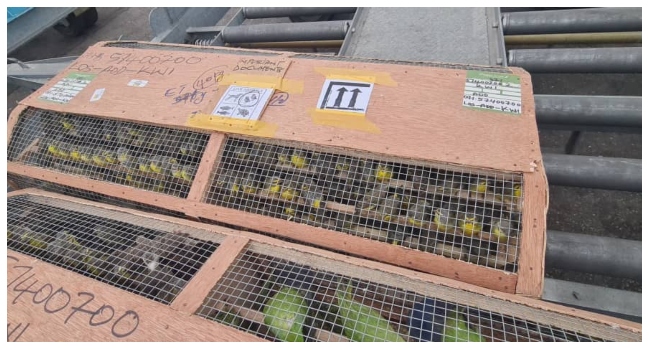Nigerian authorities have thwarted an attempt to illegally export over 1,620 live birds from Lagos to Kuwait, marking the latest seizure in ongoing efforts to combat wildlife trafficking. Officers from the Murtala Mohammed International Airport (MMIA) Area Command intercepted the consignment of Ringnecked Parakeets, commonly known as parrots, and Green and Yellow Fronted Canaries during routine cargo inspections. The birds, protected under international conservation agreements, lacked the permits required for跨境运输.
Customs Area Controller Michael Awe attributed the discovery to heightened vigilance by his team, emphasizing Nigeria’s adherence to the Convention on International Trade in Endangered Species of Wild Fauna and Flora (CITES). “No illegal shipment will slip through the cracks under my watch,” Awe stated, noting that the service’s officers remain on “high alert” to detect unlawful activities. Investigations are underway to identify those behind the smuggling operation, which violates both Nigerian law and global wildlife protection standards.
The seized birds, described as fragile and requiring urgent care, have been transferred to the National Parks Service (NPS) for rehabilitation. Experts will assess their health before attempting to reintroduce them into their natural habitats. The handover aligns with inter-agency collaboration policies championed by Bashir Adeniyi Adewale, Comptroller-General of the Nigeria Customs Service and current Chair of the World Customs Organization Council. Adewale has prioritized joint efforts to tackle transnational wildlife crime, recognizing its ties to broader organized criminal networks.
This incident follows a similar interception by the MMIA Command last month, when officers confiscated 75 bags of pangolin scales and two live pangolins—a species critically endangered due to demand in illegal wildlife markets. Nigeria’s strategic position as a trafficking hub has intensified scrutiny of its ports, with authorities increasingly deploying advanced surveillance and training to curb smuggling.
CITES, ratified by Nigeria in 1974, regulates trade in over 38,000 species to prevent exploitation threatening biodiversity. Wildlife trafficking not only endangers ecosystems but also undermines economic stability in regions reliant on natural resources. The Nigeria Customs Service reiterated its commitment to enforcing international agreements, stressing that sustainable trade practices are vital to preserving global biodiversity for future generations.
